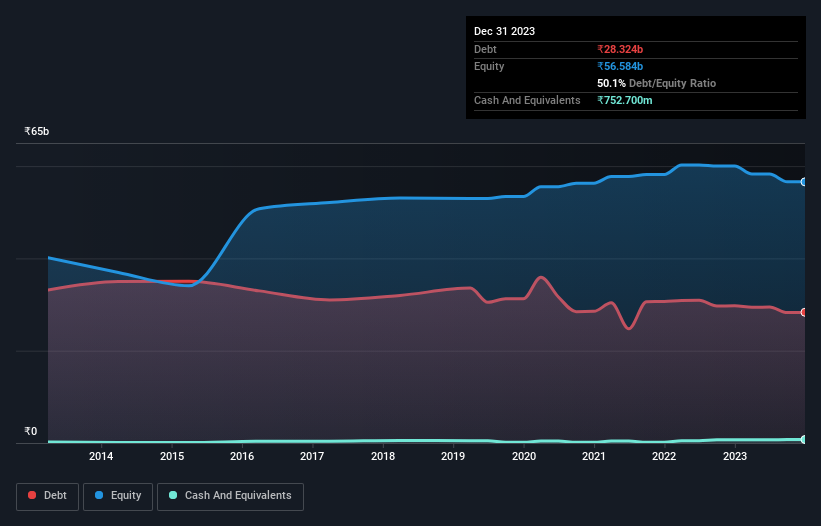Legendary fund manager Li Lu (who Charlie Munger backed) once said, 'The biggest investment risk is not the volatility of prices, but whether you will suffer a permanent loss of capital.' So it seems the smart money knows that debt - which is usually involved in bankruptcies - is a very important factor, when you assess how risky a company is. Importantly, The India Cements Limited (NSE:INDIACEM) does carry debt. But is this debt a concern to shareholders?
When Is Debt Dangerous?
Debt is a tool to help businesses grow, but if a business is incapable of paying off its lenders, then it exists at their mercy. If things get really bad, the lenders can take control of the business. However, a more usual (but still expensive) situation is where a company must dilute shareholders at a cheap share price simply to get debt under control. Having said that, the most common situation is where a company manages its debt reasonably well - and to its own advantage. The first step when considering a company's debt levels is to consider its cash and debt together.
See our latest analysis for India Cements
What Is India Cements's Net Debt?
You can click the graphic below for the historical numbers, but it shows that India Cements had ₹28.3b of debt in September 2023, down from ₹29.7b, one year before. However, it also had ₹752.7m in cash, and so its net debt is ₹27.6b.

How Strong Is India Cements' Balance Sheet?
According to the last reported balance sheet, India Cements had liabilities of ₹29.9b due within 12 months, and liabilities of ₹25.9b due beyond 12 months. On the other hand, it had cash of ₹752.7m and ₹19.3b worth of receivables due within a year. So its liabilities total ₹35.7b more than the combination of its cash and short-term receivables.
This deficit isn't so bad because India Cements is worth ₹69.6b, and thus could probably raise enough capital to shore up its balance sheet, if the need arose. But it's clear that we should definitely closely examine whether it can manage its debt without dilution. The balance sheet is clearly the area to focus on when you are analysing debt. But ultimately the future profitability of the business will decide if India Cements can strengthen its balance sheet over time. So if you want to see what the professionals think, you might find this free report on analyst profit forecasts to be interesting.
In the last year India Cements had a loss before interest and tax, and actually shrunk its revenue by 3.8%, to ₹53b. That's not what we would hope to see.
Caveat Emptor
Importantly, India Cements had an earnings before interest and tax (EBIT) loss over the last year. Indeed, it lost ₹2.1b at the EBIT level. Considering that alongside the liabilities mentioned above does not give us much confidence that company should be using so much debt. So we think its balance sheet is a little strained, though not beyond repair. However, it doesn't help that it burned through ₹994m of cash over the last year. So suffice it to say we do consider the stock to be risky. The balance sheet is clearly the area to focus on when you are analysing debt. However, not all investment risk resides within the balance sheet - far from it. To that end, you should be aware of the 1 warning sign we've spotted with India Cements .
At the end of the day, it's often better to focus on companies that are free from net debt. You can access our special list of such companies (all with a track record of profit growth). It's free.
New: AI Stock Screener & Alerts
Our new AI Stock Screener scans the market every day to uncover opportunities.
• Dividend Powerhouses (3%+ Yield)
• Undervalued Small Caps with Insider Buying
• High growth Tech and AI Companies
Or build your own from over 50 metrics.
Have feedback on this article? Concerned about the content? Get in touch with us directly. Alternatively, email editorial-team (at) simplywallst.com.
This article by Simply Wall St is general in nature. We provide commentary based on historical data and analyst forecasts only using an unbiased methodology and our articles are not intended to be financial advice. It does not constitute a recommendation to buy or sell any stock, and does not take account of your objectives, or your financial situation. We aim to bring you long-term focused analysis driven by fundamental data. Note that our analysis may not factor in the latest price-sensitive company announcements or qualitative material. Simply Wall St has no position in any stocks mentioned.
About NSEI:INDIACEM
India Cements
Manufactures and sells cement and cement related products in India.
Moderate growth potential with mediocre balance sheet.
Similar Companies
Market Insights
Community Narratives






